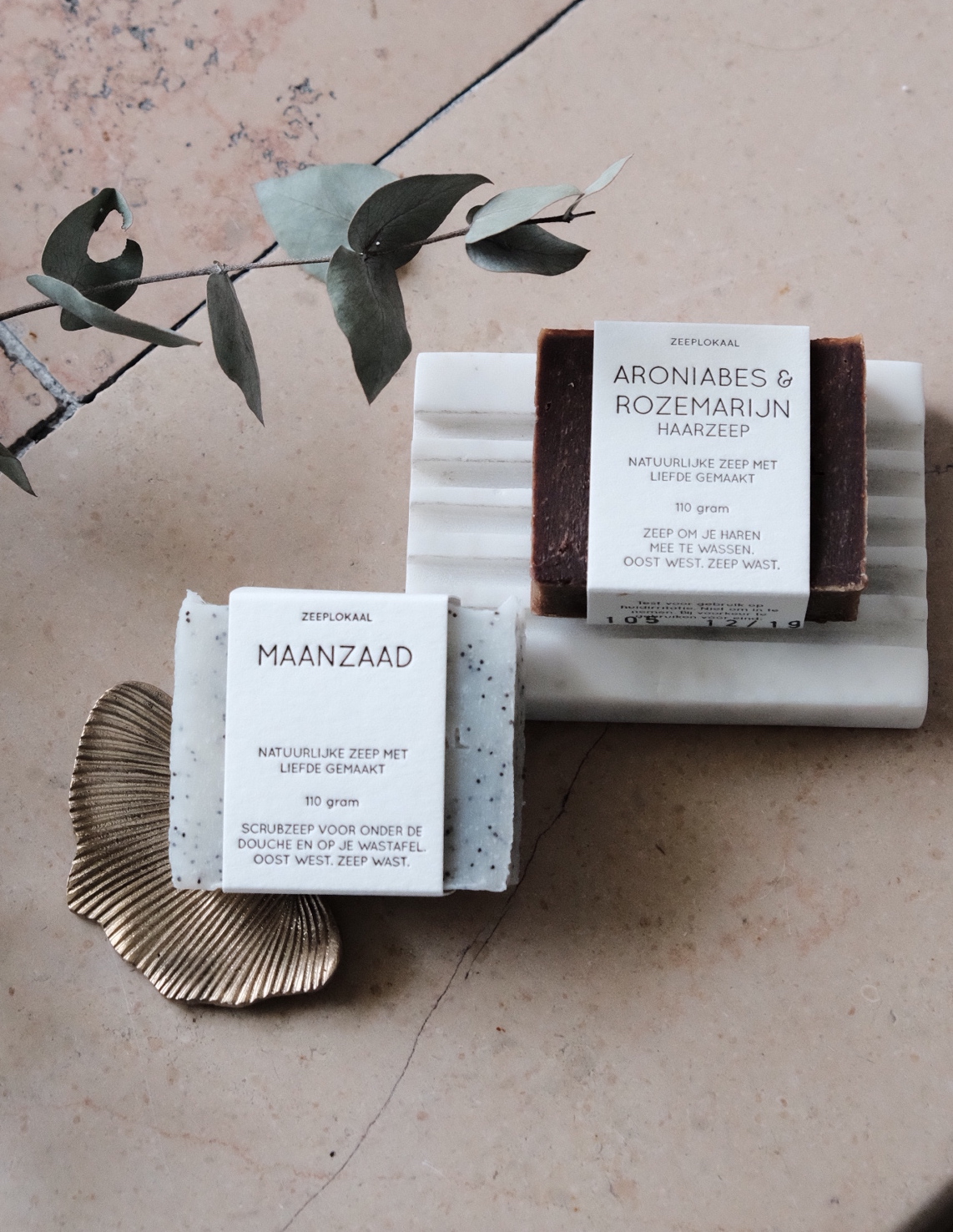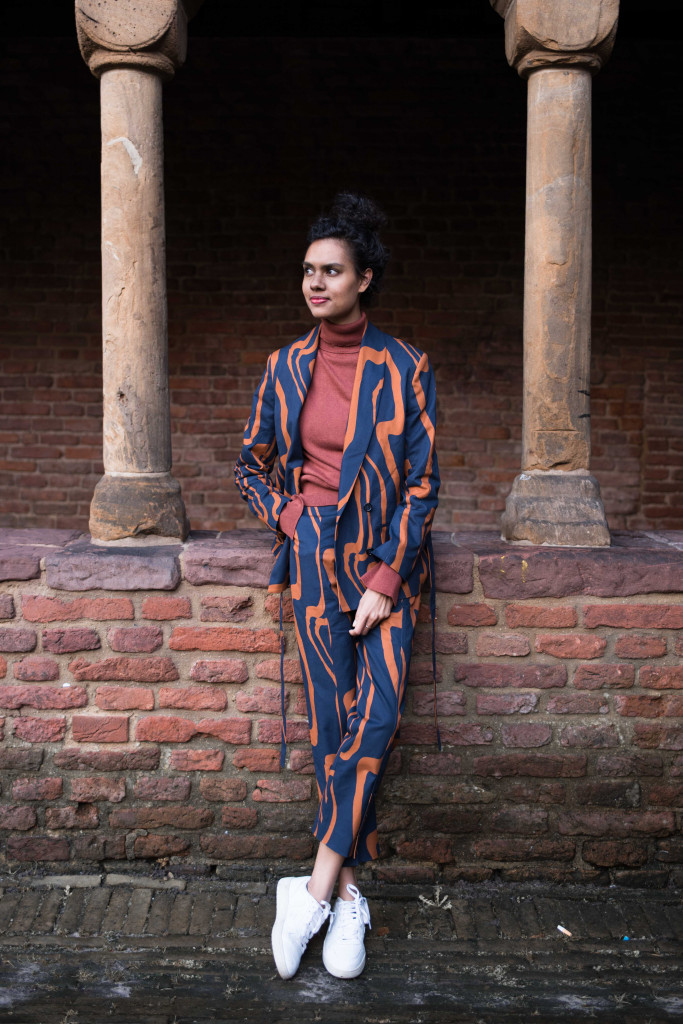As the founder and editor-in-chief of Soulstores.com, Talita Kalloe makes a positive impact by featuring shops, makers, and brands that have a soul—and are ethical and sustainable. Drawing from her perfectly complementary professional background as a freelance journalist, copywriter, and content expert for a diverse range of brands and companies in various industries, Talita understands that a good brand, especially one with a good mission, needs to share its story and purpose in an authentic way. She does exactly this and so much more with Soulstores.com, an incredible resource for those looking to explore and support a sustainable lifestyle while discovering very special concept stores and beautiful independent brands.
I was connected to Talita via Julia Otilia, the designer of a gently handcrafted, minimalist organic jewelry label with ethics and the environment at its core and is thus, in Talita’s words, a soul brand. Talita and I met earlier this year in Utrecht at her new venture, the Soulstores showroom and gift shop, in LOU Oudenoord and chatted over coffee and tea in Karibou Café. LOU (Leegstand Oplossers or “vacancy solvers” Utrecht) is a temporary real estate project, creating social and cultural value for the surrounding community. This building houses 180 social entrepreneurs, artists, and creators and is a fitting base for Talita and Soulstores.

Talita, can you tell me your motivation for starting Soulstores.com?
The idea for Soulstores.com came to me when I was working in a company that represented stores in fashion, shoes, and interior. I was working in the communication department as the editor and later on, as the editor-in-chief for their magazine. [At the time], there was a big crisis in retail and a lot of retailers went bankrupt. There were a lot of vacant retail spaces so the shopping streets were very sober. At the same time I noticed that that gave a lot of room for a new generation of entrepreneurs to stand up. When I walked through the shopping streets I saw concept stores like we know them now. And I noticed that there wasn’t only fashion or interior design in those stores but a mixture of many segments. I also noticed that the owners behind the concept had a really beautiful mission with their products; they wanted to communicate their mission to the world. Their stores were a manifestation of their vision to do something good so all the products [they carried] also had their own stories.
I went to every store personally and interviewed the owner in person. On one hand, I wanted to capture the soul behind the store. On the other hand, I wanted to tell the stories behind the brands that perfectly fit in a soul store. That way I could connect the stores and brands with the conscious consumer, and inform the consumers about how they can make well-informed conscious buying choices and where to shop when they want to bring them into practice. In essence, that’s my greater mission: to stimulate conscious consumerism.
That’s why you also find articles on Soulstores.com that tell you everything you need to know about how a garment is made or what exactly it means when something is made out of recycled plastic, and if it is sustainable or not. You can easily fall in the trap of getting lost in wanting to be sustainable. Because when you are being realistic and think about it, you cannot be 100% sustainable overnight. That’s why I want to encourage everybody to start one step at a time. Just do what fits your lifestyle and be gentle with yourself. Then you will see that you can easily flow in a sustainable lifestyle because it becomes part of your life. And that, for me, feels like the most durable and natural solution.

For example, first you start by throwing your vegetables in a special [composting] bin or buying only vintage clothing for one month. Then maybe you can save up to buy one garment that is a bit more expensive but is sustainably made. That is also something I want to encourage with Soulstores.com because sustainable products can be more expensive than H&M and Zara but when you make a conscious decision to buy one sweater for 200 euros instead of ten sweaters for 20 euros, you’ll see that it was totally worth it. The sweaters from Zara and Primark only last one season, maybe two, and then you can throw them away. But [most likely] you can wear the sweater for 200 euros for several seasons—and years. If you start to think like this and make that part of your buying decision, your perspective will change. Before you know it, two years from now, you will have a completely sustainable wardrobe without even noticing it. That’s why I want to encourage you to go the flow, and to allow yourself to give it some time.
That’s also why I have a love/hate relationship with activism because on one hand I believe activism is needed to have what I call ‘the hardcore people.’ I admire them for raising their voice and standing for what they believe in. But I also believe that we get most of the things done when we act out of love. Not only for ourselves, but also with the people around us, without judging or pointing fingers at each other. I think we need both [ways] to make an impact, and I believe in the gentle way to do it.
You said that when you write a piece…
I want to capture the soul of the story in a written piece. Because when you walk into a soul store, it’s something you feel instantly. In a soul store, the owner is doing it from a really strong intrinsic motivation but also she or he loves what she or he does. And then it will be a seed that spreads itself. This goes beyond stores as we know them. A soul store for me is when a purpose-driven entrepreneur creates, sells, or makes you experience something unique to make a positive impact, without compromising on style. Those stores, brands, and makers deserve a platform and that’s what I want to capture in my articles on Soulstores.com.
So lovely. You also mentioned that if you are addressing a problematic part of production, you still end on a positive note. What are your thoughts on denim?
Denim is a very environmentally unfriendly garment. For one piece of denim you need 7000 to 8000 liters of water to produce it. And there are a lot of chemicals that are involved as well that pollute the waters in those areas. It’s a very nasty business. I could write about how nasty the denim industry is and then you would look at your denim and think, ‘Oh my god, I’m a terrible person.’ But I don’t want to make people feel terrible about what they buy and where. That’s why I always choose to end my articles on a positive note and show them a sustainable alternative. I want to show them that there are jean labels with a circular business model like MUD jeans. There are labels that dye their jeans with an ozone technique or are able to reduce the amount of water they use for their jeans. I tell you about the brands you can buy to look good and also do good at the same time.

For example, some people say you cannot buy clothing from recycled plastic because of the problem of micro plastics ending up in the water when you wash them. Then it will instantly pollute everything around us again. But there is another way to look at it. You can also only buy outerwear made from recycled plastic, like a jacket or raincoat. I have a raincoat from recycled plastic because you don’t wash a raincoat, you know? So you can also think about that. Make sure that every sustainable decision you make is something you can intertwine with your lifestyle. I will never tell someone what to do, I only inform, motivate, and inspire and when someone makes a well-informed conscious buying choice because of that, I’m a happy woman.
When did you start Soulstores.com?
I started Soulstores.com in 2016.
Wow, congratulations! It’s quite a platform considering you’ve been doing it since then.
That’s so nice of you to say, thank you.
When did you open your showroom/gift shop?
November of 2018. To be completely honest, sometimes I just do things on intuition, without a plan [laid] out. I just see an opportunity, I go with it, and then suddenly I have something. Sometimes I’m like, ‘Uh oh—what am I going to do with this?’ The gift shop was such an idea, but I’m happy I acted on it.
So essentially, you also live by your soul.
Yes, I live by my soul. I work very organically and intuitively but the showroom is essentially my own soul store with personally curated brands that I love. The brands that I have in my soul store are the ones that I want to support because I see a lot of potential. I also believe that when you want to share the soul of a product, you have to taste, see, or smell it to complete the soulful experience of that product. That’s why the story behind it is so important.
I want to give these brands a broader platform not only online but also offline. And I hope that one day I will have my own little store space where I can do this for a beautiful selection of brands.

Did you already have a relationship with the brands that are in your Soul Store showroom or did you find them?
Almost all of the brands are ones that I already had a relationship with because they contacted me to have an article on Soulstores.com or I met them on a sustainable fair, like Giselle from Brandt Kaarsen. I met Julia [Otilia] on the same fair. The sustainable world is a very small world in the Netherlands and we all know each other. The great part is that we all support each other. We connect with each other and it starts to grow. It’s a beautiful flow of things and it’s one of the things that I love most about my job.
Have you ever been approached by a brand that didn’t resonate with your mission?
That’s a good question because I find the style aspect to be really important for Soulstores.com. Sometimes there is a brand that has a great story, a great motivation, or a beautiful mission, but the website doesn’t look good. Or the styling or the pictures are set up kind of amateurishly. That would also reflect on me so I owe it to my readers to keep certain quality and style standards. I find it very difficult to tell a brand that wants to support their makers in Africa with product sales that I cannot collaborate with them at this stage because their website doesn’t resonate with my standards. That is a personal struggle. But I never just say no, I always want to offer a solution when I see potential, like helping out with their website or branding. I truly want to see where I can help because when the website doesn’t look good, not only will I not buy something from them, neither will my followers.
I think it’s part of our sustainable impact to be at least as good as [big] commercial brands because we need to be part of the bigger game or else we cannot have an impact. Professional branding, website, and image are essential for that [impact].

You know from experience that it needs to be commercial and professional.
Yes. Branding is so important. Branding and marketing are so important if you want to succeed with your brand, unfortunately. I see a lot of brands and stores fail because of that and it hurts me because I know that when you are so good at making products, it doesn’t necessarily mean that you are good at marketing. Nobody expects that but you need to do it in this business and it’s hard. Often, brands don’t have money to hire me as a copywriter or content strategist. That’s why I’ve done a lot of things for free but now I have to ask for money for what I do. [Otherwise] I wouldn’t be taking myself seriously as well. The battle between doing good and earning money is something that a lot of sustainable entrepreneurs struggle with, in my experience.
I suppose it’s about figuring out how to work with brands that can pay you.
That’s why I am trying to find the right balance between working for big corporations with a sustainable ambition and smaller brands. That way I can charge the smaller brands less, if I truly believe in their potential. When I earn more money from someone who can [afford] it, I can help the one who needs it the most. Because often the smaller independent stores, makers, and brands are where the greatest stories are hidden!
Soul Stores Giftshop
LOU Oudenoord
Oudenoord 330
Room C0.60
Utrecht
Please email in advance to make an appointment to visit the gift shop: hallo@soulstores.com.


0 thoughts on “Talita Kalloe of Soulstores”